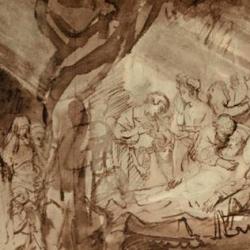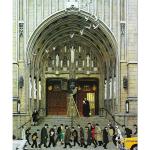Isaiah 63:10-14 reviews Yahweh’s history with Israel. He saved them through the “angel of His face,” lifted them up from the sea and carried them (like the daughter of Pharaoh rescuing Moses from the Nile). He put His Spirit “in the midst” (qereb) of Israel. But they rebelled, so Yahweh turned and fought against them.
The picture is of Yahweh inserting His Spirit into “him,” into the inner parts of a man. But in fact the Lord sent His Holy Spirit to dwell in the midst of Israel in the tent.
Through Ezekiel, the Lord promises to restore the grieved Spirit to His people. Ezekiel uses the same language: “I will put My Spirit in your midst” (36:27; qereb), and the promise is that the Spirit will once again dwell in the temple as He dwelt in the wilderness tabernacle. That the Spirit indwells Israel is evident from the plural suffix on qereb.
Ezekiel’s promise is often seen as an “individualizing” promise: Once the Spirit inhabited a house in the midst of a people, but in the new covenant He will inhabit individual human beings. That’s accurate enough theologically, because the New Testament does indicate that each believer becomes a temple of the Spirit. But Ezekiel’s focus is as corporate a Isaiah’s: In both cases, the Lord is speaking of the Spirit’s habitation of Israel.
What’s new in Ezekiel’s prophecy is not so much the mode or place of the Spirit’s presence but the results. Instead of grieving the Spirit, the Lord promises that Israel will “walk in My statutes, and you will be careful to observe My ordinances,” so that the Lord doesn’t abandon them (36:27). When the Spirit takes up residence anew in Israel, the stone heart of Israel (the tablets of the commandments) will be replaced with a flesh-heart (the Torah embodied in a man).















